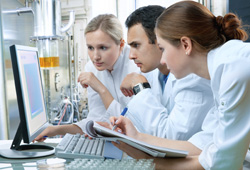Sustainable fine chemicals production with recyclable catalysts
Catalysts speed up the rate of a chemical reaction without being consumed by it by reversibly binding to a compound’s active site. This facilitates a chemical reaction faster by lowering the energy required for it to occur. Catalysts can significantly increase both the yield and purity of a product when it has high activity and is highly specific. As such, there is a tremendous amount of interest in finding improved catalysts for industrially relevant reactions. Scientists initiated the EU-funded project NANO-HOST to develop innovative, highly selective and effective recyclable catalysts for the sustainable production of fine chemicals. In addition, the project was designed to enable high-level and expert training for a number of new and experienced researchers. Research focused on the preparation, recovery and reuse of single-site nano-structured catalytic materials and the engineering of nanoreactors based on these. Heterogeneous catalysts were formed by immobilising homogenous catalysts, primarily transition metal complexes, on soluble or insoluble supports. Knowledge-based advanced catalyst design enabled improvements relative to homogeneous catalysts thanks to the supports that facilitated improved activity, selectivity and catalyst lifetime. Twenty-three researchers participated in the training programme with numerous personnel exchanges realised among the 12 partner teams. Close to 200 training sessions were delivered by the network covering instrumental techniques and complementary skills. The prolific collaboration led to 8 patents, 83 publications and a book chapter as well as numerous presentations at international conferences. This new generation of scientists are in a very strong position to meet future challenges for novel improved catalysts. Areas of application include the nanosciences, clean energy production, pollution abatement and sustainable manufacturing processes. For now, sustainable manufacturing of high added-value specialty chemicals will be a piece of cake with the recyclable catalysts produced by NANO-HOST.



